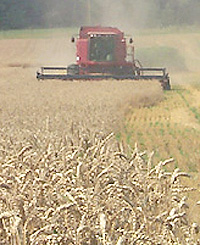Kentucky Wheat Crop Takes Hit, Lowering Yields, Test Weights
Kentucky Wheat Crop Takes Hit, Lowering Yields, Test Weights

What looked like a promising wheat crop just two months ago instead became more of an average one after diseases and hot temperatures took advantage of the crop.
“We had more barley yellow dwarf than we usually do and of course head scab came in, and the other thing was just as the seed heads began to fill the temperatures really went up, so that cut short seed development,” said Lloyd Murdock, Extension agronomist with the University of Kentucky College of Agriculture and a member of the UK Wheat Science Group. “We began harvesting about a week earlier than we usually harvest.”
UK Plant Pathologist Don Hershman added rust to the mix of diseases impacting the crop this year. Based on his visits with farmers, he said, the results of this year’s harvest are highly variable. While some fields sustained heavy disease damage, others did not.
As a result of these factors, yields that had been expected to average in the 60s instead likely will be in the 50-bushel per acre range, Murdock said.
Some farmers are being docked on prices received at the grain elevators due to the light weight of the seed. Normally, the test weight should be 58 pounds per bushel to keep from sustaining a price drop, but this year some test weights have been in the low 50s.
“The dock depends really heavily on who you are selling to,” Murdock said. “At 52 pounds per bushel, I saw the dock from two buyers range from 52 cents to $1.44 cents per bushel.”
Some of the smaller, lightweight wheat may have been blown out the back of the combines at harvest, Hershman said. This is one way farmers have of sorting good quality grain from poorer quality.
Murdock said the reasons behind increased incidences of barley yellow dwarf aren’t certain but complacency may have played a part.
“Maybe we haven’t sprayed like we should in the past because we haven’t had a good dose of it in recent years,” he said. “Barley yellow dwarf is vectored by aphids.”
The right, or more accurately the wrong type of weather was present during flowering stage of wheat leading to infections of fusarium head blight or scab. Temperatures within 68 and 86 degrees and moisture are needed along with the inoculum to cause an infection. All three were in place this year.
Scab infection can result in lower yields, more poorly developed seeds, lower test weights and the increased possibility of higher than acceptable levels of DON, deoxynivalenol (DON), or vomitoxin, resulting in loss of some markets.
Murdock said at three locations where researchers are evaluating whether there is a difference between scab incidences in no-till versus tilled wheat, there was no significant difference this year. These were large fields using both production methods, he noted.
Results on the use of Folicur are mixed, he said, but it did appear that it helped reduce the severity of head scab. The state received a special exemption from the U.S. Environmental Protection Agency to use the product this year. Hershman noted that severity was reduced by 30 to 40 percent in most fields where Folicur was used.
“The way to go in the future is resistant varieties,” Murdock said. “We’ve had them for two to three years but they had a yield lag. Some of the newer varieties don’t have that yield lag and that’s just where we need to go. Now, there’s not going to be enough seed available this year because everybody’s going to want it. But within two or three years, producers should be able to pick high yielding varieties with scab resistance.”
-30-
